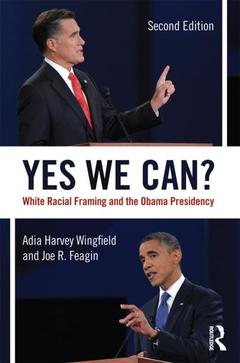Yes We Can? (2nd Ed.) White Racial Framing and the Obama Presidency
Auteurs : Harvey-Wingfield Adia, Feagin Joe

The first edition of this book offered one of the first social science analyses of Barack Obama?s historic electoral campaigns and early presidency. In this second edition the authors extend that analysis to Obama?s service in the presidency and to his second campaign to hold that presidency. Elaborating on the concept of the white racial frame, Harvey Wingfield and Feagin assess in detail the ways white racial framing was deployed by the principal characters in the electoral campaigns and during Obama?s presidency. With much relevant data, this book counters many commonsense assumptions about U.S. racial matters, politics, and institutions, particularly the notion that Obama?s presidency ushered in a major post-racial era. Readers will find this fully revised and updated book distinctively valuable because it relies on sound social science analysis to assess numerous events and aspects of this historic campaign.
Table of Contents
Preface
Acknowledgments
Chapter 1 White Racial Framing and Barack Obama’s First
Campaign
Chapter 2 "Too Black?" Or "Not Black Enough?"
Chapter 3 From Susan B. Anthony to Hillary
Clinton
Chapter 4 The Cool Black Man vs. The Fist-Bumping
Socialist
Chapter 5 The Dr. Jeremiah Wright Controversy
Chapter 6 The 2008 Primaries and Voters of Color
Chapter 7 November 4, 2008: A Dramatic Day in U.S. History
Chapter 8 A "Post-Racial" America?
Chapter 9 President Obama’s 2009-2013 Term and the 2011-2012 Primaries
Chapter 10 The 2012 National Election
Endnotes
Index
Adia Harvey Wingfield is an associate professor of sociology at Georgia State University. Her research focuses on the ways intersections of race and gender shape various groups’ experiences in different occupations. Her recent work addresses the experiences of black male nurses, minority faculty at independent schools, and black female entrepreneurs.
Joe R. Feagin is Ella C. McFadden Professor at Texas A&M University. Feagin has done research on racism and sexism issues for 48 years and has served as the Scholar-in-Residence at the U.S. Commission on Civil Rights. He has written many scholarly books and articles in his major research areas, and one book (Ghetto Revolts) has been nominated for a Pulitzer Prize. He was the 1999-2000 president of the American Sociological Association.
Date de parution : 02-2013
15.2x22.9 cm
Date de parution : 02-2013
15.2x22.9 cm
Disponible chez l'éditeur (délai d'approvisionnement : 14 jours).
Prix indicatif 178,41 €
Ajouter au panierThème d’Yes We Can? :
Mots-clés :
Adia Harvey Wingfield; Joe Feagin; 2012 election; Barack Obama; race; race and politics; presidential election; Mitt Romney; Yes we can; White Racial Framing; Hard Racial Framing; Racial Frame; Soft Racial Framing; Senator Obama; CNN Feature; Young Man; Dominant White Racial Frame; Super PAC; White Heads; White Voters; Senator Barack Obama; Dominant Racial Frame; Asian American Voters; White Media Commentators; Super Tuesday Primaries; Phone Calling; Obama’s Election; Asian Americans; President Elect Obama; Obama’s Presidential Victory; GLBT Voter; National Committee; Romney Campaign; Retro Vision



